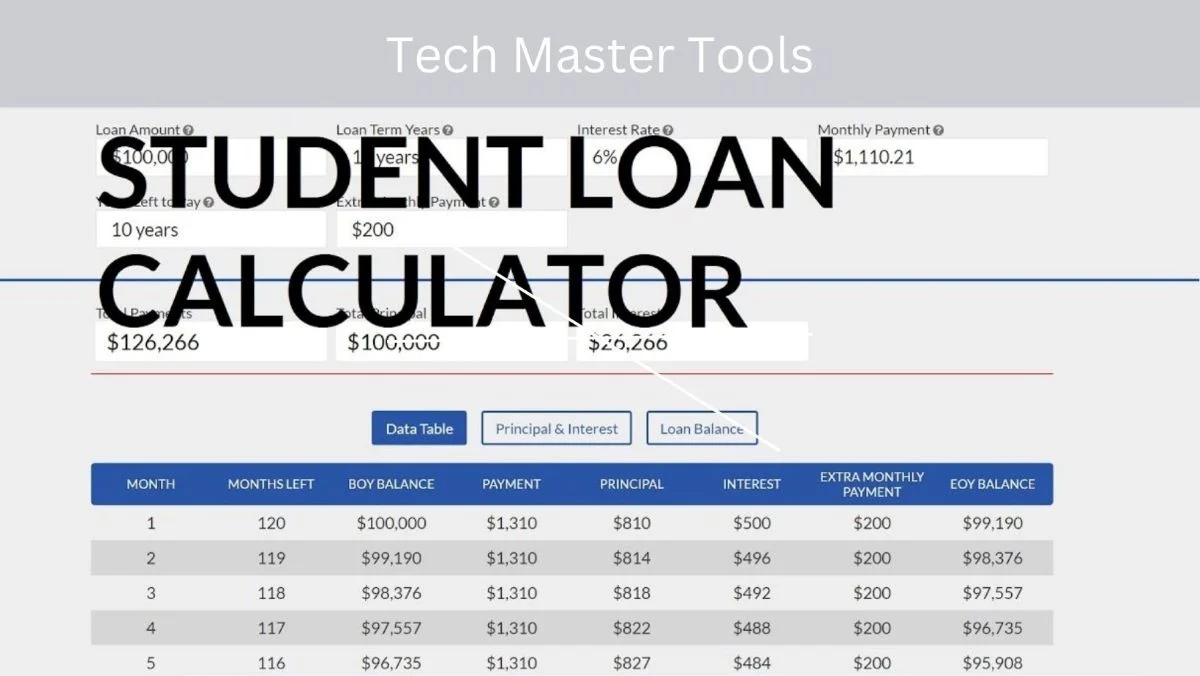Are you curious about student loan stocks and how they impact the market? As the demand for higher education continues to rise, so does interest in investing in this growing industry. Student loan stocks are a type of stock that is linked to the student loan market. They have gained popularity recently due to their potential for high returns. However, investors should be aware of the risks associated with this type of investment.
Student loan stocks can significantly impact the stock market as they are tied to a large and growing industry. Whether new to investing or looking to diversify your portfolio, understanding student loan stocks can help you make informed decisions. So let’s dive into student loan stocks and explore their benefits and drawbacks.
Understanding the Student Loan Industry and Its Impact on Stocks
The Multi-Billion Dollar Market That Affects Millions of Americans
The student loan industry is a massive market that affects millions of Americans. According to Forbes, the total outstanding student loan debt in the United States reached $1.7 trillion in 2021, with approximately 45 million borrowers. This staggering amount highlights the importance of understanding the impact of this industry on stocks.
Changes in Government Policies and Economic Conditions Can Significantly Impact the Industry and Its Stocks
Government policies and economic conditions heavily influence the student loan industry. For example, changes in interest rates can significantly impact both borrowers’ ability to repay their loans and investors’ returns on their investments. Similarly, regulatory changes can affect how lenders operate and what types of loans they offer.
One recent example is the CARES Act passed in response to COVID-19. This legislation relieved federal student loan borrowers by suspending payments and interest accrual until September 30th, 2021. While this was helpful for many borrowers, it hurt companies that service these loans since they rely on collecting fees from these accounts.
Factors to Consider When Evaluating Student Loan Stocks
Investors looking to invest in student loan stocks should consider several factors before making any decisions:
- Default Rates: High default rates are a red flag for investors since they indicate that borrowers struggle to repay their loans.
- Interest Rates: Interest rate changes can significantly impact borrower behaviour and investor returns.
- Regulatory Changes: Regulations governing student lending practices can change quickly and dramatically, impacting lenders’ profitability.
- Competition: The student loan industry is highly competitive, with many different types of lenders vying for business.
Investors should keep an eye out for emerging trends within the industry, such as income-share agreements (ISAs) or alternative forms of financing like boot camps.
Who Does Student Loan Debt Affect?
Factors Affecting Student Loan Stocks: Interest Rates, Government Policies, and More
Interest Rates Play a Significant Role in Determining the Demand for Student Loans
Interest rates are among the most critical factors impacting student loan stocks. The interest rate is the cost of borrowing money, and it determines how much a borrower will have to pay back on top of the initial amount borrowed. When interest rates are low, more people tend to take out student loans because they can afford to pay them back with lower interest. Conversely, when interest rates are high, fewer people take out loans because they need help to repay them.
The Federal Reserve’s Interest Rate Policies Can Impact the Cost of Borrowing for Both Lenders and Borrowers
The Federal Reserve is essential in setting interest rates across the United States economy. It uses monetary policy tools such as raising or lowering short-term interest rates to control inflation and stabilize economic growth. When short-term interest rates rise, banks borrow less from each other, which means there is less money available to lend out to students who need loans. This decrease in lending can drive up the cost of borrowing for both lenders and borrowers.
Government Policies Such as Changes to Loan Forgiveness Programs Can Affect the Value of Student Loan Stocks
Government policies can also significantly impact student loan stocks. For example, changes made by Congress or federal agencies regarding loan forgiveness programs can cause significant fluctuations in stock prices for companies that provide student loans. If a program is eliminated or reduced in scope, it could lead to fewer borrowers taking out new loans or refinancing existing ones.
Economic Conditions Such as Inflation and Unemployment Rates Can Also Impact the Performance of Student Loan Providers and Lenders
Economic conditions like inflation and unemployment rates can also play a role in determining how well student loan providers perform financially. Inflation causes prices to rise over time, meaning lenders may need to charge higher interest rates to keep up with the cost of borrowing.
Identifying Stocks that Will Benefit from the Injunction Against Student Loan Payments
Bankruptcy may be an option for those struggling with student loan debt.
Student loan debt has significantly burdened millions of students in the United States. Many individuals have struggled to repay their loans, leading to financial difficulties and bankruptcy. However, filing for bankruptcy is not always the best solution. It can negatively impact credit scores and lead to long-term economic consequences.
One alternative is to consider refinancing or consolidation options. Refinancing allows borrowers to obtain a new loan with lower interest rates or better terms, while consolidation combines multiple loans into one payment.
Another option is income-driven repayment plans that adjust monthly payments based on income levels and family size. These programs can help make student loan payments more manageable without requiring borrowers to file for bankruptcy.
The Supreme Court recently upheld a decision that could lead to more student loan forgiveness.
In June 2021, the Supreme Court upheld a decision stating that private companies servicing federal student loans cannot collect specific fees from borrowers who are in default. This ruling could lead to more widespread forgiveness of student loan debt.
Investors looking for stocks that may benefit from this ruling should consider companies involved in servicing or collecting student loans, such as Navient Corporation (NAVI) or Nelnet Inc (NNI). Both companies have experienced stock price increases since the ruling was announced.
President Joe Biden has proposed a plan to reduce student loan interest rates.
President Joe Biden has proposed several measures to reduce the burden of student loan debt on borrowers. One proposal includes reducing interest rates on undergraduate federal loans from 2.75% to 0%. This would save borrowers thousands of dollars over the life of their loans and make it easier for them to repay their debts.
Evaluating the Safety and Potential Profitability of Investing in Student Loan Asset-Backed Securities
What are student loan asset-backed securities?
Student loan asset-backed securities (SLABS) allow investors to earn money from student loans. Securitization turns student loans into securities that can be bought and sold on the market.
Why are SLABS considered safe investments?
SLABS are considered relatively safe investments because the underlying student loan assets back them. This means that if a borrower defaults on their loan, the investor still has some collateral to fall back on.
How can you evaluate the creditworthiness of borrowers before investing in SLABS?
Before investing in SLABS, it’s essential to do a credit check on the borrowers to evaluate their ability to repay their loans. Factors such as income, employment history, and debt-to-income ratio can show how likely a borrower is to default on their loan.
Can investing in SLABS be profitable?
According to financial writer Maurie Backman, investing in SLABS can be profitable for passive income. As with any investment, there is always some level of risk involved. However, SLABS are considered relatively safe investments and have historically had low default rates, so that they may be attractive for investors looking for steady returns.
Analyzing the Impact of Student Loan Forgiveness on the Stock Market
Student Loan Forgiveness: A Game Changer for the Stock Market?
Student loan forgiveness has been discussed recently, and many people have different opinions. While some believe it will benefit students and the economy, others are sceptical about its impact on the stock market.
The Possibility of Loan Forgiveness Can Cause Investors to Sell Off Student Loan Stocks
One potential impact of student loan forgiveness on the stock market is that investors may sell off their holdings in companies that provide student loans. This could cause a decline in these stocks’ value, affecting investors and lenders who rely on these stocks as collateral for loans.
On The Other Hand, If Loan Forgiveness Is Implemented, It Could Lead To Increased Consumer Spending And Economic Growth
On the flip side, if student loan forgiveness is implemented, it could lead to increased consumer spending and economic growth. With fewer debt obligations, individuals would have more disposable income to spend on things like buying homes or starting businesses. This could boost economic activity and benefit various industries.
The Impact Of Student Loan Forgiveness On The Stock Market Is Uncertain And Depends On Various Factors
The impact of student loan forgiveness on the stock market is uncertain and depends on several factors, such as how much debt is forgiven and which types of loans qualify for forgiveness. Different industries may be affected differently based on their exposure to student loans.
Juno’s Exclusive Student Loan Refinance Deals
Saving Money on Loan Payments with Juno
If you’re a student loan borrower, refinancing your loans can be an excellent way to save money on interest and reduce your monthly payments. Juno is a loan provider that offers exclusive student loan refinance deals to help borrowers achieve these goals.
Juno partners with private lenders to provide lower interest rates and fees than public or federal student loans. This means that you could save thousands of dollars over the life of your loan by refinancing with Juno.
The Refinancing Process with Juno
One of the best things about refinancing with Juno is that their process includes a soft credit check, which won’t impact your credit score. This allows you to see what rates and terms you may qualify for without risk to your credit score.
Once you’ve completed the application process and been approved for refinancing, Juno will email you all the details about your new loan. You’ll also receive a welcome packet about managing your new loan and making payments.
Recognition from Experts
NerdWallet named Juno as one of the best student loan refinance providers for 2021. According to NerdWallet, “Juno stands out for its partnership model, which connects borrowers directly with community banks and credit unions.” This approach allows borrowers to access more competitive rates than they might find elsewhere.
Christy Bieber from The Motley Fool recommends Juno for its competitive APR rates and unique benefits, such as an Uber gift card for refinancing. She notes that “Juno’s APRs are among some of the lowest available,” making it an excellent choice for anyone saving money on their student loans.
The Bottom Line on Investing in Student Loan Stocks: Risks and Rewards
Investing in student loan stocks can be a lucrative business opportunity but comes with risks. As an investor, you must understand the potential rewards and risks of investing in this industry before making investment decisions.
Earnings and Revenue
Student loan companies generate revenue by charging interest on loans and servicing fees. These companies are generally profitable due to their high-interest rates on loans. However, interest rate hikes can affect their earnings, which may reduce the loan demand. Moreover, changes in the default rate can impact their earnings as well.
Cost of Servicing Loans
Another factor affecting student loan companies’ profitability is the cost of servicing loans. As time passes, these costs may increase for various reasons, such as inflation or changes in technology requirements for servicing loans. Therefore, investors should assess a company’s ability to manage these costs over several years.
Default Rates
Default rates are among the most critical when investing in student loan stocks. A higher default rate means fewer payments from borrowers leading to lower profits for the company. Investors should check a company’s track record regarding default rates before investing their money.
Risks vs Rewards
Investing in student loan stocks requires careful consideration since it involves risks and rewards. While there is potential for high returns on investment due to high-interest rates charged on loans, there is also significant risk involved if borrowers fail to repay their debts.
Case Study: Navient Corporation (NAVI)
Navient Corporation is a prominent player in the student loan industry, with billions of dollars worth of assets under management. The company has been facing numerous lawsuits over alleged malpractices, such as predatory lending practices and misleading borrowers regarding repayment options.
Despite these challenges, Navient has continued to generate significant revenue and profits.
Personal Finance Education: How to Manage Your Student Loans and Finances
Understanding Student Loans
Student loans are a necessary part of paying for higher education. These loans come from the federal government, private lenders, or schools. It’s essential to understand the terms and conditions of your student loans, including interest rates, repayment options, and any fees associated with the loan.
Making Regular Payments
Making regular student loan payments can help improve your credit score. Late payments can negatively impact your credit score and make it harder to get approved for other types of credit. Consider setting up automatic payments to ensure you get all the payments.
Creating a Budget
A budget can help you manage your student loan payments and other expenses. Start by tracking all of your income and expenses each month. Look for areas where you can cut back on spending to have more money to put towards your student loan debt.
Seeking Out Resources
Seeking out resources such as financial advisors or online tools can help you better understand and manage your student debt. Many free online resources can help you create a personalized plan for managing your finances.
When Should You Pay Off Your Student Loans?
The answer to this question depends on several factors, including how much debt you have, what type of interest rate you have on your loans, and what other financial goals you have. Some people pay off their student loans as quickly as possible, while others take a more gradual approach.
How Do Student Loans Work in the US? There are two main types of student loans: federal loans and private loans. The government offers federal loans, which typically have lower interest rates than personal loans. Banks or other financial institutions offer private loans and often require a cosigner.
Where Does Student Loan Come From?
As mentioned earlier, student loans come from various sources, such as the federal government, private lenders, or schools.
Top Companies in the Student Loan Industry: An Overview of Their Stocks
Sallie Mae
Sallie Mae is a publicly traded company that specializes in providing student loans. It was founded in 1972 as a government-sponsored enterprise but became a private company in 2004. Sallie Mae has two main business segments: consumer banking and education loan management.
Over the past five years, Sallie Mae’s stock has grown significantly, with a return of over 150%. The company’s strong financial performance can be attributed to its focus on expanding its product offerings and improving customer experience. The demand for higher education continues to rise, which creates a steady stream of customers for Sallie Mae.
Navient Corporation
Navient Corporation is another major player in the student loan industry. It was created in 2014 when Sallie Mae split into two separate companies. Navient focuses on servicing and collecting student loans rather than originating them. Navient’s stock has been relatively stable, with a return of around 20% over the past five years. While Navient faces some regulatory challenges due to allegations of deceptive practices, it remains one of the largest student loan servicers in the country.
Discover Financial Services
Discover Financial Services is primarily known for its credit cards but also offers private student loans through its subsidiary Discover Student Loans. The company has seen steady growth in its stock price over the past few years thanks to its diversified business model.
Discover Financial Services’ commitment to innovation and technology has helped it stand out from other lenders in the market. For example, it recently launched an online tool allowing borrowers to compare different repayment options based on their circumstances.
Enticing to Investors: Why Student Loan Stocks Are a Lucrative Investment Opportunity
Many investors find student loan stocks to be lucrative investment opportunity.
Investors are always looking for opportunities that can give them good investment returns. Student loan stocks have emerged as one such option. These stocks belong to companies that lend money to students so they can pursue higher education. The demand for student loans is always high, which makes these stocks an attractive investment option for many investors.
The steady growth and stability of the student loan industry entice investors.
The student loan industry has been growing steadily over the past few years, which is expected to continue. This is because more and more students are opting for higher education, and the cost of education continues to rise. As a result, there will always be a demand for student loans, making this industry relatively stable.
The potential for high returns on investment makes student loan stocks an attractive option for many investors.
Student loan stocks have the potential to provide high returns on investment due to several factors:
- These companies charge high-interest rates on their loans, which translates into higher profits.
- As mentioned earlier, the demand for student loans is always high, ensuring a steady flow of revenue for these companies.
- Since most students take several years to repay their loans fully, these companies enjoy long-term revenue streams.
Investors looking to invest in student loan stocks should consider several factors before making any decisions. They should research different companies operating in this sector and evaluate their financial performance over time. They should also monitor any regulatory changes impacting this industry’s profitability.
Keywords: many investors, investors
Questions: why is student loan interest so high? Why are student loan interest rates so high? Where does student loan money come from?
Student loans’ interest rates are generally higher than other loans, such as home or car loans.
Making Informed Decisions About Investing in Student Loan Stocks
Investing in student loan stocks can be a lucrative opportunity for investors who understand the industry and its impact on the stock market. By analyzing factors such as interest rates, government policies, and potential injunctions against student loan payments, investors can identify stocks that are likely to perform well.
However, investing in student loan stocks also comes with risks. It’s essential to evaluate the safety and potential profitability of investing in asset-backed securities and consider the impact of possible student loan forgiveness programs on the stock market.
If you’re interested in investing in student loan stocks, educating yourself about personal finance and managing your finances effectively is crucial. Consider Juno’s exclusive student loan refinance deals as a way to save money on your student loans while also gaining insight into the industry.
Overall, investing in student loan stocks requires careful consideration of risks and rewards. Investors can take advantage of this enticing investment opportunity by staying informed about industry trends and making educated decisions.
FAQs:
Q: What are some factors that affect student loan stocks?
A: Interest rates, government policies related to education and lending practices, economic conditions, and legal injunctions against payment can all impact the performance of student loan stocks.
Q: Is investing in asset-backed securities a safe option for those interested in student loan stocks?
A: Asset-backed securities can offer relatively stable returns but come with their own set of risks. It’s essential to evaluate each safety carefully before making an investment decision.
Q: How might potential programs for student loan forgiveness affect the stock market?
A: The possibility of widespread debt forgiveness could lead to decreased demand for certain types of securities or negatively impact companies that rely heavily on revenue from servicing loans.
Q: What resources are available for individuals learning more about personal finance?
A: Many online resources are available for learning about personal finance, including Juno’s student loan refinance deals and educational materials.






